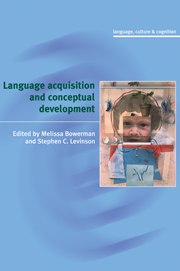Introduction
Published online by Cambridge University Press: 26 January 2010
Summary
Background issues
Epistemology
This volume touches issues at the heart of Western thinking: how do we know what we know, and what are the mental prerequisites that make such knowledge possible? There is no better way to study these ancient epistemological questions than to examine carefully how children learn to think and speak. But the careful study of children's development dates back only to the end of the nineteenth century (see chapter by Deutsch, Wagner, Burchardt, Schulz, & Nakath, this volume), and indeed some of the most interesting techniques for investigation have only been devised in the last few years, in some cases by the contributors to this volume. Here then is a relatively new field of investigation which is rapidly evolving, but which, rather than being a narrow specialism like many modern branches of science, talks directly to the fundamental questions about why we think the way we do. It is a subject that every psychologist or cognitive scientist, every linguist or social scientist, every historian of ideas or philosopher, should keep an eye on. This volume should help to make accessible recent thought in the area, and give some sense of the intellectual ferment which characterizes it.
Two kinds of recent development have radically changed the way we think about this area. It will be useful to the reader to identify a number of the other themes that run through the chapters in this volume.
- Type
- Chapter
- Information
- Language Acquisition and Conceptual Development , pp. 1 - 16Publisher: Cambridge University PressPrint publication year: 2001
- 7
- Cited by

